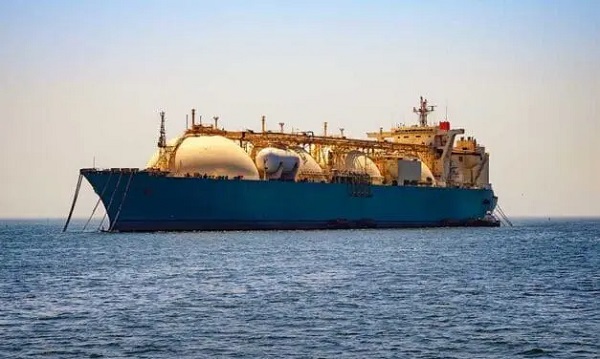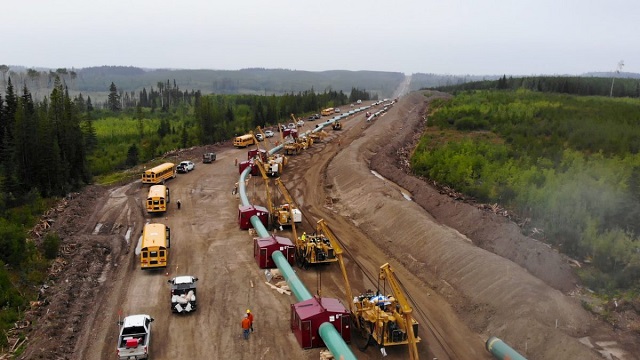Energy
Canada’s LNG breakthrough must be just the beginning

This article supplied by Troy Media.
 By Lisa Baiton
By Lisa Baiton
Without decisive action, Canada risks missing out on a generational opportunity
For decades, Canada has relied almost exclusively on the United States to buy our natural gas exports. We are one of the world’s top natural gas exporters, selling nearly half of our total natural gas production each year, but about 99 percent of those exports go to a single customer south of
our border.
This trading relationship has been reliable, even though it has meant selling our natural gas at a lower price. But things are changing.
A good business has more than one customer, and over the past decade our biggest customer has become the largest Liquefied Natural Gas (LNG) exporter on the planet.
But Canada has taken a major step forward. LNG Canada’s first shipment to international markets marks a historic breakthrough—it’s the country’s largest private investment and puts Canada on the map as a global supplier of LNG.
This achievement deserves celebration. It demonstrates that Canada can build and deliver major energy infrastructure, unlocking economic opportunities for Indigenous Nations, British Columbians, and Canadians across the country. Just as the TransMountain pipeline expansion diversified our global customer base boosted our GDP, and enabled production growth, LNG exports can do for our natural gas sector. Natural gas royalties from LNG Canada alone are projected to contribute $23 billion to British Columbia’s government over its 40-year lifespan. Building a facility of similar scale to LNG Canada is estimated to create over 35,000 jobs during construction and add up to $4.5 billion to our national GDP annually. It’s a glimpse of what’s possible.
But we can’t stop here.
Without decisive action to scale up LNG, Canada risks missing out on a generational opportunity to secure economic sovereignty and meet rising global energy demand.
Global demand for LNG is surging. Shell forecasts a 60 per cent increase by 2040, driven by Asian economic growth, the decarbonization of heavy industry and transport, and new energy demands from artificial intelligence. Most G7 leaders have called for a full ban on Russian energy imports, and countries around the world are actively seeking secure, stable suppliers. Canada, as the fourth-largest oil producer and fifth-largest natural gas producer, is well-positioned to help fill that gap.
So why haven’t we? Despite our resource wealth, Canada lags on infrastructure and policy. While others sprint for global contracts, we’re stuck in red tape. Our permitting system is slow, uncertain, and hostile to investment. That must change.
The government’s two-year approval target is a step forward, as is the recent work our Prime Minister and Energy Minister Hodgson are doing to promote energy trade in Poland and Germany, including LNG. But deeper reforms are needed to create a clear, competitive, investor-friendly system that accelerates development.
We must also prioritize infrastructure investment. With strategic investments in pipelines, LNG terminals, and port capacity, we can connect our vast natural gas reserves to highdemand markets across Asia, Europe, and beyond.
Equally crucial is diversification. The U.S. will remain a vital customer, but relying on one market is no longer tenable. Japan, Europe, and emerging Asian economies are actively seeking partners—and Canada must be ready to meet them with reliable supplies and long-term contracts.
Indigenous participation will be key to success. Canada’s emerging LNG export industry is demonstrating what’s possible with the Haisla Nation’s Cedar LNG, the world’s first Indigenous majority-owned LNG project, along with Woodfibre LNG being advanced in partnership with the Squamish Nation, and Ksi Lisims LNG being co-developed with the Nisga’a Nation. Expanding the LNG sector offers an opportunity to advance reconciliation meaningfully, through ownership, jobs, and long-term prosperity.
This is a pivotal moment. The first phase of LNG Canada must be just the start. The world needs our energy. It’s time to deliver.
Lisa Baiton is the president and CEO of the Canadian Association of Petroleum Producers
Troy Media empowers Canadian community news outlets by providing independent, insightful analysis and commentary. Our mission is to support local media in helping Canadians stay informed and engaged by delivering reliable content that strengthens community connections and deepens understanding across the country.
Business
Large-scale energy investments remain a pipe dream

I view the recent announcements by the Government of Canada as window dressing, and not addressing the fundamental issue which is that projects are drowning in bureaucratic red tape and regulatory overburden. We don’t need them picking winners and losers, a fool’s errand in my opinion, but rather make it easier to do business within Canada and stop the hemorrhaging of Foreign Direct Investment from this country.
Thanks for reading William’s Substack!
Subscribe for free to receive new posts and support my work.
Changes are afoot—reportedly, carve-outs and tweaks to federal regulations that would help attract investment in a new oil pipeline from Alberta. But any private proponent to come out of this deal will presumably be handpicked to advance through the narrow Bill C-5 window, aided by one-off fixes and exemptions.
That approach can only move us so far. It doesn’t address the underlying problem.
Anyone in the investment world will tell you a patchwork of adjustments is nowhere near enough to unlock the large-scale energy investment this country needs. And from that investor’s perspective, the horizon stretches far beyond a single political cycle. Even if this government promises clarity today in the much-anticipated memorandum of understanding (MOU), who knows whether it will be around by the time any major proposal actually moves forward.
With all of the talk of “nation-building” projects, I have often been asked what my thoughts are about what we must see from the federal government.
The energy sector is the file the feds have to get right. It is by far the largest component of Canadian exports, with oil accounting for $147 billion in 2024 (20 percent of all exports), and energy as a whole accounting for $227 billion of exports (30 percent of all exports).
Furthermore, we are home to some of the largest resource reserves in the world, including oil (third-largest in proven reserves) and natural gas (ninth-largest). Canada needs to wholeheartedly embrace that. Natural resource exceptionalism is exactly what Canada is, and we should be proud of it.
One of the most important factors that drives investment is commodity prices. But that is set by market forces.
Beyond that, I have always said that the two most important things one considers before looking at a project are the rule of law and regulatory certainty.
The Liberal government has been obtuse when it comes to whether it will continue the West Coast tanker ban (Bill C-48) or lift it to make way for a pipeline. But nobody will propose a pipeline without the regulatory and legal certainty that they will not be seriously hindered should they propose to build one.
Meanwhile, the proposed emissions cap is something that sets an incredibly negative tone, a sentiment that is the most influential factor in ensuring funds flow. Finally, the Impact Assessment Act, often referred to as the “no more pipelines bill” (Bill C-69), has started to blur the lines between provincial and federal authority.
All three are supposedly on the table for tweaks or carve-outs. But that may not be enough.
It is interesting that Norway—a country that built its wealth on oil and natural gas—has adopted the mantra that as long as oil is a part of the global economy, it will be the last producer standing. It does so while marrying conventional energy with lower-carbon standards. We should be more like Norway.
Rather than constantly speaking down to the sector, the Canadian government should embrace the wealth that this represents and adopt a similar narrative.
The sector isn’t looking for handouts. Rather, it is looking for certainty, and a government proud of the work that they do and is willing to say so to Canada and the rest of the world. Foreign direct investment outflows have been a huge issue for Canada, and one of the bigger drags on our economy.
Almost all of the major project announcements Prime Minister Mark Carney has made to date have been about existing projects, often decades in the making, which are not really “additive” to the economy and are reflective of the regulatory overburden that industry faces en masse.
I have always said governments are about setting the rules of the game, while it is up to businesses to decide whether they wish to participate or to pick up the ball and look elsewhere.
Capital is mobile and will pursue the best risk-adjusted returns it can find. But the flow of capital from our country proves that Canada is viewed as just too risky for investors.
The government’s job is not to try to pick winners and losers. History has shown that governments are horrible at that. Rather, it should create a risk-appropriate environment with stable and capital-attractive rules in place, and then get out of the way and see where the chips fall.
Link to The Hub article: Large-scale energy investments remain a pipe dream
Formerly the head of institutional equity research at FirstEnergy Capital Corp and ATB Capital Markets. I have been involved in the energy sector in either the sell side or corporately for over 25 years
Thanks for reading William’s Substack!
Subscribe for free to receive new posts and support my work.
Energy
Expanding Canadian energy production could help lower global emissions

From the Fraser Institute
By Annika Segelhorst and Elmira Aliakbari
Canada’s most timely opportunity to lower overall global emissions is through expanded exports to regions that rely on higher-emitting fuel sources.
The COP30 climate conference in Brazil is winding down, after more than a week of discussions about environmental policy and climate change. Domestic oil and natural gas production is frequently seen as a fundamental obstacle to Canada’s climate goals. Yet the data shows that Canadian energy production is already among the world’s cleanest, generating lower greenhouse gas (GHG) emissions per barrel-of-oil-equivalent produced, among major producing countries. Expanding the role of Canadian oil and gas in global markets can replace higher GHG-emitting alternatives around the world, driving down global GHG emissions.
Prime Minister Carney’s first budget highlights Canada’s “emissions advantage” in a chart on page 105 that compares the amount of GHG emissions released from producing oil and natural gas across 20 major producing countries. Compared to many other top-producing countries, Canada releases fewer GHG emissions per barrel of oil and gas produced when considering all phases of production (extraction, processing, transport, venting and flaring).
For oil production, Canada has an advantage over most major producers such as Venezuela, Libya, Iran, Algeria, Nigeria, China, Russia and Qatar. Canada’s emissions per barrel of oil produced are below the global average, making Canada among the lower emitting producers worldwide.
Similarly, Canada’s natural gas production has an emissions per barrel equivalent that is lower than the global average and is below major producers such as Turkmenistan, Uzbekistan, Nigeria, Indonesia, China, Argentina, Malaysia, Australia, Algeria, Iran, Russia, India and the United States. The chart below reveals countrywide average GHG emissions per barrel of oil or natural gas produced in 2022.
Source: International Energy Agency (2023), The Oil and Gas Industry in Net Zero Transitions 2023, IEA, Paris, p. 69
Canada’s emissions advantage stems from years of technological innovations that require less energy to produce each barrel of oil along with improvements in detecting leaks. From 1990 to 2023, Canada’s total production of crude oil rose by 199 per cent, while emissions per barrel of oil produced declined by 8 per cent, according to Environment and Climate Change Canada (ECCC). In the oilsands, since 1990 emissions per barrel have fallen by nearly 40 per cent while emissions from natural gas production and processing have decreased by 23 per cent.
Canada has already implemented many of the most practical and straightforward methods for reducing carbon emissions during oil and gas production, like mitigation of methane emissions. These low-hanging fruits, the easiest and most cost-effective ways to reduce emissions, have already been implemented. The remaining strategies to reduce GHG emissions for Canadian oil and gas production will be increasingly expensive and will take longer to implement. One such approach is carbon capture, utilization, and storage (CCUS), a technology which traps and stores carbon dioxide to prevent it from reaching the atmosphere. Major infrastructure projects like this offer potential but will be difficult, costly and resource intensive to implement.
Rather than focusing on increasingly expensive emission reductions at home, Canada’s most timely opportunity to lower overall global emissions is through expanded exports to regions that rely on higher-emitting fuel sources. Under a scenario of expanded Canadian production, countries that presently rely on oil and gas from higher-emitting producers can instead source energy from Canada, resulting in a net reduction in global emissions. Conversely, if Canada were to stagnate or even retreat from the world market for oil and gas, higher-emitting producers would increase exports to accommodate the gap, leading to higher overall emissions.
As Canada’s climate and energy policy continues to evolve, our attention should focus on global impact rather than solely on domestic emissions reductions. The highest environmental impact will come from enabling global consumption to shift towards lower-emitting Canadian sources.
-

 Energy1 day ago
Energy1 day agoExpanding Canadian energy production could help lower global emissions
-

 Business1 day ago
Business1 day agoWill the Port of Churchill ever cease to be a dream?
-

 Great Reset2 days ago
Great Reset2 days agoEXCLUSIVE: The Nova Scotia RCMP Veterans’ Association IS TARGETING VETERANS with Euthanasia
-

 Daily Caller2 days ago
Daily Caller2 days agoSpreading Sedition? Media Defends Democrats Calling On Soldiers And Officers To Defy Chain Of Command
-

 Health2 days ago
Health2 days agoDisabled Canadians petition Parliament to reverse MAiD for non-terminal conditions
-

 COVID-1915 hours ago
COVID-1915 hours agoFreedom Convoy protestor Evan Blackman convicted at retrial even after original trial judge deemed him a “peacemaker”
-

 Business1 day ago
Business1 day agoThe numbers Canada uses to set policy don’t add up
-

 Business1 day ago
Business1 day agoNew airline compensation rules could threaten regional travel and push up ticket prices









